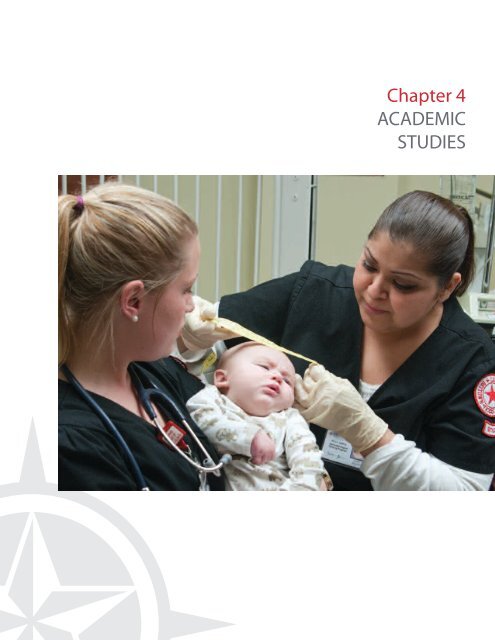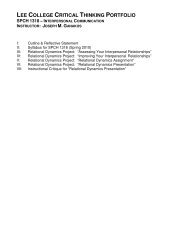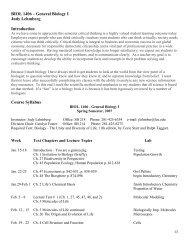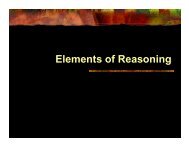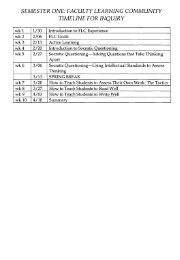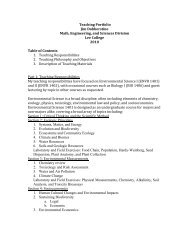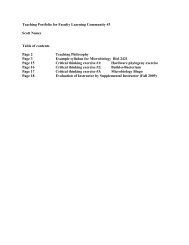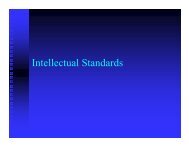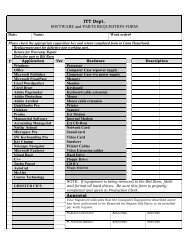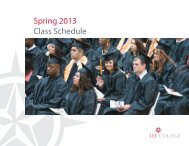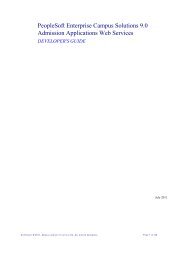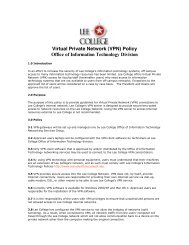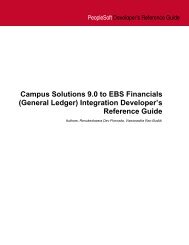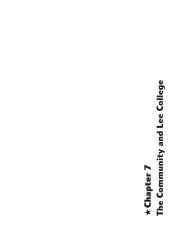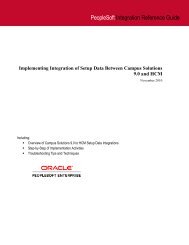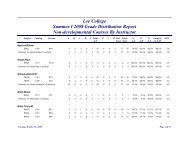Chapter 4 ACADEMIC STUDIES - Lee College
Chapter 4 ACADEMIC STUDIES - Lee College
Chapter 4 ACADEMIC STUDIES - Lee College
You also want an ePaper? Increase the reach of your titles
YUMPU automatically turns print PDFs into web optimized ePapers that Google loves.
<strong>Chapter</strong> 4<br />
<strong>ACADEMIC</strong><br />
<strong>STUDIES</strong>
Degrees & Certificates<br />
Area of Study AA AS AAS Cert pg<br />
Accounting • • 87<br />
Alcohol & Drug Abuse Counseling • 118<br />
American Studies – Honors • 73<br />
Architecture • 73<br />
Architectural Construction &<br />
Building Tech. • 102<br />
Audio Engineering Technology • • 92<br />
Biology • 81<br />
Business • 68<br />
CAAD Engineering Technology • • 101<br />
Career Pilot • 91<br />
Chemistry • 81<br />
Child Development • • 105<br />
Church Music • 74<br />
Coding (Health & Medical) • 111<br />
Computer Maintenance Technology • • 97<br />
Computer Science • 69<br />
Cosmetology • • 99<br />
Cosmetology Student Instructor • 100<br />
Criminal Justice • 70<br />
Digital Media • • 96<br />
Drama • 74<br />
E-Business Web Development • • 95<br />
Education (Teaching) • 66<br />
Electrical Construction • 107<br />
Electrical Technology • • 106<br />
English • 75<br />
Entrepreneurship • 90<br />
Environmental Science • 82<br />
Game Design • • 108<br />
General Studies • 75<br />
Geology • 82<br />
Health Info Technology • 110<br />
Humanities • 77<br />
Industrial System Technology • • 112<br />
Instrumentation (Analytical) • 114<br />
Instrumentation (Industrial) • • 113<br />
International Business • 90<br />
Kinesiology/Health • 76<br />
Kinesiology/Physical Education • 76<br />
Literature • 77<br />
Logistics Management • • 115<br />
Machinist • 112<br />
Area of Study AA AS AAS Cert pg<br />
Management • • 89<br />
Manufacturing Engineering<br />
Technology • 116<br />
Marketing • 89<br />
Mathematics • 83<br />
Mechanical Technology • 102<br />
Medical Transcription • 111<br />
Mental Health Services • 117<br />
Mexican American Studies<br />
(Liberal Arts) • 78<br />
Millwright • 112<br />
Music • 71<br />
Music Studio Production • 93<br />
Network Maintenance (Computer) • 98<br />
Nursing, Registered & Transitional • 119-120<br />
Nursing, Vocational (LVN) • 123<br />
Paralegal Studies • • 124<br />
Personal Computer Support • • 94<br />
Physics • 83<br />
Physical Therapist Assistant • 125<br />
Pilot – Career • 91<br />
Pilot – Commercial • 91<br />
Pilot – Instrument • 91<br />
Pipefitting Technology • • 126<br />
Pre-Engineering • 84<br />
Process Instrumentation &<br />
Electrical Design • 104<br />
Process Piping Design • • 103<br />
Process Technology • • 127<br />
Professional Administrative • • 128<br />
Safety Management Technology • • 130<br />
Social Sciences • 78<br />
Social Work • 79<br />
Sound Reinforcement Technology • 93<br />
Spanish • 79<br />
Speech Communications • 67<br />
Substance Abuse Prevention • 118<br />
Supervision • 90<br />
Visual Arts • 80<br />
Visual Arts: Imaging • 80<br />
Welding Technology • • 131<br />
Wiring Installation • 107<br />
56
Introduction<br />
This section of the Catalog is devoted to describing the<br />
options available to the <strong>Lee</strong> <strong>College</strong> students who<br />
(1) plan to earn a certificate or associate degree from <strong>Lee</strong><br />
<strong>College</strong>, (2) plan to transfer the credits they earn at <strong>Lee</strong><br />
<strong>College</strong> to another institution, or (3) both graduate and<br />
transfer.<br />
Coordinating Board-approved certificates require from 15 to<br />
59 semester credit hours; associate degrees require 60 to 66<br />
credits. For students considering a career in a technical field,<br />
an investment of one to four semesters of study is very<br />
reasonable. For students planning to earn baccalaureate<br />
degrees, the additional credits or effort needed to earn<br />
additional credits is also a reasonable investment in the<br />
future.<br />
Some students, however, may wish to transfer to other<br />
institutions without earning a degree at <strong>Lee</strong> <strong>College</strong>.<br />
Students who plan to transfer to other institutions – with or<br />
without a <strong>Lee</strong> <strong>College</strong> degree – should obtain a catalog from<br />
the institution to which they plan to transfer and work with<br />
a <strong>Lee</strong> <strong>College</strong> counselor in the selection of their courses.<br />
Course options and degree requirements at universities<br />
vary from institution to institution and, in many cases, from<br />
college to college within institutions.<br />
A complete list of the degree and certificate options is listed<br />
on the table on page 52. Use this to guide<br />
you to the planning pages for the degree or certificate you<br />
are interested in pursuing. To view the course descriptions,<br />
go to <strong>Chapter</strong> 6.<br />
Core Curriculum<br />
The State of Texas has mandated for the intellectual development<br />
of college students through an integrated model<br />
of competencies, perspectives, and exemplary educational<br />
objectives that can be supplemented through institutionally-designed<br />
options. The definitions that follow parallel the<br />
course options for core curricula.<br />
Definition of Core Curriculum Competencies<br />
The Core Curriculum guidelines described here are predicated<br />
on the judgment that a series of basic intellectual<br />
competencies – reading, writing, speaking, listening, critical<br />
thinking, and computer literacy – are essential to the learning<br />
process in any discipline and should form any core curriculum.<br />
Although students can be expected to come to<br />
college with some experience in exercising these competencies,<br />
they often need further instruction and practice to<br />
meet college standards and, later, to succeed in both their<br />
major field of academic study and their chosen career or<br />
profession.<br />
Reading: Reading at the college level means the ability to<br />
analyze and interpret a variety of printed materials – books,<br />
articles, and documents. A core curriculum should offer<br />
students the opportunity to master both general methods<br />
of analyzing printed materials and specific methods for<br />
analyzing the subject matter of individual disciplines.<br />
Writing: Competency in writing is the ability to produce<br />
clear, correct, and coherent prose adapted to purpose,<br />
occasion, and audience. Although correct grammar, spelling,<br />
and punctuation are each a fundamental element in any<br />
composition, they do not automatically ensure that the<br />
composition itself makes sense or that the writer has much<br />
of anything to say. Students need to be familiar with the<br />
writing process, including how to discover a topic, how to<br />
develop and organize it, and how to phrase it effectively for<br />
their audience. These abilities can be acquired only through<br />
practice and reflection.<br />
Speaking: Competence in speaking is the ability to communicate<br />
orally in clear, coherent, and persuasive language<br />
appropriate to purpose, occasion, and audience. Developing<br />
this competency includes acquiring poise and developing<br />
control of the language through experience in making presentations<br />
to small groups, large groups, and through the<br />
media.<br />
Listening: Listening at the college level means the ability to<br />
analyze and interpret various forms of spoken communication.<br />
Critical Thinking: Critical thinking embraces methods for<br />
applying both qualitative and quantitative skills analytically<br />
and creatively to subject matter in order to evaluate arguments<br />
and to construct alternative strategies. Problem<br />
solving is one of the applications of critical thinking used to<br />
address an identified task.<br />
perspectives<br />
Another imperative of a core curriculum is that it contains<br />
courses that help students achieve the following:<br />
1. Establish broad and multiple perspectives on the<br />
individual in relationship to the larger society and world<br />
in which he or she lives, and to understand the responsibilities<br />
of living in a culturally and ethnically diversified<br />
world;<br />
57
2. Stimulate a capacity to discuss and reflect upon<br />
individual, political, economic, and social aspects of life in<br />
order to understand ways in which to be a responsible<br />
member of society;<br />
3. Recognize the importance of maintaining health and<br />
wellness;<br />
4. Develop a capacity to use knowledge of how technology<br />
and science affect their lives;<br />
5. Develop personal values for ethical behavior;<br />
6. Develop the ability to make aesthetic judgments;<br />
7. Use logical reasoning in problem solving; and<br />
8. Integrate knowledge and understanding the interrelationships<br />
of the scholarly disciplines.<br />
Educational Exemplary Objectives<br />
Some of these intellectual competencies have traditionally<br />
been tied in specific courses required of all students during<br />
their two years of college. For example, courses in college<br />
composition, together with mathematics, have long been<br />
the cornerstone experience of the freshman year. But a single<br />
course or two-course sequence in college composition<br />
can do little more than introduce students to the principles<br />
and practices of good writing. Within the boundary of three<br />
to six semester credit hours of course work, neither of these<br />
sequences can guarantee proficiency. Moreover, in most<br />
curricula there are no required courses specifically dedicated<br />
to reading or to critical thinking. Thus, if a core curriculum is<br />
to prepare students effectively, it is imperative that, insofar<br />
as possible, these intellectual competencies be included<br />
among the objectives of many individual core courses and<br />
reflected in their course content.<br />
Communication (composition, speech, modern language)<br />
The objective of a communication component of a core<br />
curriculum is to enable the student to communicate effectively<br />
in clear and correct prose in a style appropriate to the<br />
subject, occasion, and audience.<br />
1. To understand and demonstrate writing and speaking<br />
processes through invention, organization, drafting,<br />
revision, editing, and presentation.<br />
2. To understand the importance of specifying audience<br />
and purpose and to select appropriate communication<br />
choices.<br />
3. To understand and appropriately apply modes of expression,<br />
i.e., descriptive, expositive, narrative, scientific, and<br />
self-expressive, in written, visual, and oral communications.<br />
4. To participate effectively in groups with emphasis on<br />
listening, critical and reflective thinking, and responding.<br />
5. To understand and apply basic principles of critical thinking,<br />
problem solving, and technical proficiency in the<br />
development of exposition and argument.<br />
6. To develop the ability to research and write a documented<br />
paper and/or to give an oral presentation<br />
Mathematics<br />
The objective of the mathematics component of the core<br />
curriculum is to develop a quantitatively literate college<br />
graduate. Every college graduate should be able to apply<br />
basic mathematics tools in the solution of real-world<br />
problems.<br />
1. To apply arithmetic, algebraic, geometric, higher-order<br />
thinking, and statistical methods to modeling and solving<br />
real-world situations.<br />
2. To represent and evaluate basic mathematics information<br />
verbally, numerically, graphically, and symbolically.<br />
3. To expand mathematical reasoning skills and formal logic<br />
to develop convincing mathematical arguments.<br />
4. To use appropriate technology to enhance mathematical<br />
thinking and understanding and to solve mathematical<br />
problems and judge reasonableness of the results.<br />
5. To interpret mathematical models such as formulas,<br />
graphs, tables, and schematics and draw inferences from<br />
them.<br />
6. To develop the limitations of mathematical and statistical<br />
models.<br />
7. To develop the view that mathematics is an evolving<br />
discipline interrelated with human culture and understand<br />
its connections to other disciplines.<br />
natural Sciences<br />
The objective of the study of a natural sciences component<br />
of a core curriculum is to enable the student to understand,<br />
construct, and evaluate relationships in the natural sciences<br />
and to enable the student to understand the bases for<br />
building and testing theories.<br />
1. To understand and apply method and appropriate technology<br />
to the study of natural sciences.<br />
2. To recognize scientific and quantitative methods and the<br />
differences between these approaches and other methods<br />
of inquiry and to communicate findings, analyses,<br />
and interpretation both orally and in writing.<br />
3. To identify and recognize the differences among com peting<br />
scientific theories.<br />
4. To demonstrate knowledge of the major issues and problems<br />
facing modern science, including issues that touch<br />
upon ethics, values, and public policies.<br />
5. To demonstrate knowledge of the interdependence of<br />
science, and technology and their influence on and contribution<br />
to modern culture.<br />
58
humanities and Visual/performing Arts<br />
The objective of the Humanities and Visual/Performing Arts<br />
in a core curriculum is to expand the student’s knowledge of<br />
the human condition and human cultures, especially in<br />
relation to behaviors, ideas, and values expressed in works<br />
of human imagination and thoughts. Through study in<br />
disciplines such as literature, philosophy, and the visual/<br />
performing arts, students will engage in critical analysis,<br />
form aesthetic judgments, and develop an appreciation of<br />
the arts and humanities as fundamental to the health and<br />
survival of any society. Students should have experience in<br />
both the Arts and Humanities.<br />
1. To demonstrate awareness of the scope and variety of<br />
works in the Arts and Humanities.<br />
2. To understand those works as expressions of individual<br />
and human values within a historical and social context.<br />
3. To respond critically to works in the Arts and Humanities.<br />
4. To engage in the creative process or interpretive performance<br />
and comprehend the physical and intellectual<br />
demands required of the author or visual or performing<br />
artist.<br />
5. To articulate an informed personal reaction to works in<br />
the Arts and Humanities.<br />
6. To develop an appreciation for the aesthetic principles<br />
that guide or govern the Humanities and Arts.<br />
7. To demonstrate knowledge of the influence of literature,<br />
philosophy, and/or the Arts on intercultural experience.<br />
Social and Behavioral Sciences<br />
The objective of a social and behavioral sciences component<br />
of a core curriculum is to increase students’ knowledge of<br />
how social and behavioral scientists discover, describe, and<br />
explain the behaviors and interactions among individuals,<br />
groups, institutions, events, and ideas. Such knowledge will<br />
better equip students to understand themselves and the<br />
roles they play in addressing the issues facing humanity.<br />
1. To employ the appropriate methods, technologies, and<br />
data that social and behavioral scientists use to investigate<br />
the human condition.<br />
2. To examine social institutions and processes across a<br />
range of historical periods, social structure, and culture.<br />
3. To use and critique alternative explanatory systems or<br />
theories.<br />
4. To develop and communicate alternative explanations<br />
or solutions for contemporary social issues.<br />
5. To analyze the effects of historical, social, political,<br />
economic, cultural, and global forces on the area under<br />
study.<br />
6. To comprehend the origins and evolution of U.S. and<br />
Texas political systems, with a focus on the growth of<br />
political institutions, the constitutions of the U.S. and<br />
Texas, federalism, civil liberties, and civil and human<br />
rights.<br />
7. To understand the evolution and current role of the U.S.<br />
in the world.<br />
8. To differentiate and analyze historical evidence (documentary<br />
and statistical) and differing points of view.<br />
9. To recognize and apply reasonable criteria for the<br />
acceptability of historical evidence and social research.<br />
10. To analyze, critically assess, and develop creative solutions<br />
to public policy problems.<br />
11. To recognize and assume one’s responsibility as a citizen<br />
in a democratic society by learning to think for oneself,<br />
by engaging public discourse and obtaining information<br />
through the news media and other appropriate information<br />
sources about politics and public policy.<br />
12. To identify and understand differences and commonalities<br />
within diverse cultures.<br />
health, Wellness, and Kinesiology<br />
(Institution Option)<br />
By requiring a Kinesiology credit as part of the core curriculum,<br />
with no exemption for age, <strong>Lee</strong> <strong>College</strong> emphasizes lifelong<br />
wellness and learning. Students may choose from<br />
courses that support lifelong activity and health within the<br />
range of their physical condition.<br />
1. Utilizing the Surgeon General Report, examine the benefits<br />
of physical activity as it relates to personal health and<br />
life span development as well as the workplace.<br />
2. Understand the basic principles of exercise to develop<br />
lifelong habits for mental and physical well-being.<br />
3. Apply knowledge of the benefits of physical activity to<br />
develop a personal exercise plan or develop personal<br />
health goals.<br />
59
Core Curriculum Options<br />
The primary purpose of the AA, AS, and AAT degrees are to prepare students to transfer and meet prerequisites for junior level<br />
courses. The core curriculum is an essential, state-mandated component of these associate degrees. The table below provides<br />
course options to meet the general core curriculum requirements and matches those listed for the Associate of Arts (AA)<br />
degree. Subsequent degrees, Fields of Study, and Areas of Concentration provide specific modifications to the core curriculum<br />
that meet the needs of students transferring in academic concentrations. A course can only be counted once in meeting core<br />
curriculum requirements. Course title and descriptions can be found in <strong>Chapter</strong> 6.<br />
SCh<br />
Communication ENGL 1301 & 1302 6<br />
Communication/Other SPCH 1311 1315 1318 3<br />
1321 1342<br />
DRAM 2336<br />
Mathematics MATH 1316 1324 1332 1314 3 or 4<br />
1342 2412 2413 2414<br />
Natural Sciences BIOL 1406 1407 1411 1413 1424 8<br />
2401 2402 2404 2416 2421<br />
CHEM 1405 1411 1412<br />
1419 2423 2425<br />
PHYS 1401 1402 1403 1404<br />
1405 1407 1415 2425 2426<br />
ENVR 1401 1402<br />
GEOL 1403 1404 1405<br />
Humanities ARCH 1301 1302 1311 3<br />
Visual/Performing Arts ARTS 1301 1303 1304<br />
DRAM 1310 2361 2362 2366<br />
MUSI 1303 1306 1310 1311<br />
Humanities/Other ENGL 2322 2323 2326 2327 2328 3<br />
2331 2341 2351<br />
HIST 2321 2322<br />
HUMA 1301 1302 1305<br />
PHIL 1301 1304 2306<br />
Social/Behavioral Science GOVT 2305 & 2306 6<br />
HIST 1301 1302 2301 6<br />
SBS/Other ECON 2301 2302 3<br />
GEOG 1303<br />
PSYC 2301 2314<br />
SOCI 1301 1306 2319<br />
Kinesiology Select from the following KINE courses 1101-1152, 1183-1188, 1<br />
1301, 1304, 1305, 1306,<br />
1332, 1338, 2155<br />
Core Total 42-43<br />
60
Associate of Arts (AA)<br />
Associate of Arts in Teaching (AAT)<br />
Associate of Science (AS)<br />
The Associate of Arts (AA), Associate of Arts in Teaching<br />
(AAT), and Associate of Science (AS) degrees are<br />
designed for students who plan to transfer to four-year<br />
institutions and pursue baccalaureate degrees. AA,<br />
AAT, and AS degrees include 60 to 66 hours of freshman<br />
and sophomore courses. Degrees are based on<br />
the core curriculum developed by the State of Texas<br />
and are updated to include Fields of Study as they become<br />
available from the state. The AAT degree is<br />
designed for teacher preparation and specifically<br />
transfers to upper division education programs.<br />
Because of common course numbering and similarity<br />
in degree plans, students can easily matriculate to universities<br />
with most credits being accepted by public<br />
postsecondary institutions in Texas.<br />
Graduation Requirements: see <strong>Chapter</strong> 1,<br />
p. 27<br />
Core Curriculum Completion<br />
<strong>Lee</strong> <strong>College</strong> recognizes completion of the core curriculum<br />
for students seeking AA, AAT, and AS degrees that<br />
have completed the entire core curriculum with <strong>Lee</strong><br />
<strong>College</strong> with a GPA of 2.0 or better. At graduation, students<br />
will receive an acknowledgement for core curriculum<br />
completed. All students who complete the<br />
core curriculum will have it noted on their transcript.<br />
Field of Study<br />
Field of study curricula were mandated by the state legislature<br />
in 1997. These programs offer transferability to general<br />
academic teaching institutions in the state of Texas and<br />
guarantee substitution for lower-division requirements for<br />
the degree program. <strong>Lee</strong> <strong>College</strong> currently offers Field of<br />
Study in five areas: Computer Science, Criminal Justice,<br />
Music, Speech-Communications, and Business.<br />
Area of Concentration<br />
Areas of Concentration (AOC) provide structure to the elective<br />
courses taken to complete an AA or AS degree. Students<br />
focused on a major for Bachelor’s degree work have multiple<br />
AOCs to choose from. It is the responsibility of the student to<br />
contact the transfer university to obtain its specific course<br />
requirements and enroll in appropriate lower division<br />
courses.<br />
Articulation Agreements<br />
Articulation agreements are specific degree plans agreed<br />
upon between <strong>Lee</strong> <strong>College</strong> and a 4-year institute of higher<br />
education. A list of current transfer articulation agreements<br />
can be found at: http://www.lee.edu/counseling/transfer<br />
_articulation_agreements.asp.<br />
61
Distance Education<br />
Distance Learning<br />
Distance learning provides quality education in a nontraditional<br />
environment, where the student and faculty<br />
member are in different locations. <strong>Lee</strong> <strong>College</strong> faculty strives<br />
to promote superior online learning through the college’s<br />
online learning management system.<br />
<strong>Lee</strong> <strong>College</strong> offers several options for students who are selfmotivated<br />
and prefer independent learning. Distance learning<br />
courses require an orientation with the instructor, either<br />
personally or online. Courses are completed during a single<br />
semester with deadlines set by instructors for course assignments<br />
and exams.<br />
Distance Education provides courses in which a majority<br />
(more than 50 percent) of the instruction occurs when the<br />
student(s) and instructor(s) are not in the same place. Two<br />
categories of distance education courses are defined as:<br />
Fully Distance Education Course<br />
A course with mandatory face-to-face sessions totaling<br />
no more than 15 percent of the instructional time. Examples<br />
of face-to-face sessions include orientation, laboratory,<br />
exam review, or an in-person test.<br />
Hybrid/Blended Course<br />
A course in which a majority (more than 50 percent but<br />
less than 85 percent), of the planned instruction occurs<br />
when the student(s) and instructor(s) are not in the same<br />
place.<br />
Distance Education Course Length<br />
Classes may be offered in a variety of lengths throughout<br />
the semester. During the Spring and Fall semester, classes<br />
will be offered in 16-week, 12-week, or 8-week sessions. During<br />
the summer semester, classes will be offered in 10 weeks<br />
or 5 weeks.<br />
<strong>Lee</strong> <strong>College</strong> Course Delivery System<br />
Courses will be offered online through <strong>Lee</strong> <strong>College</strong>’s Learning<br />
Management System (LMS).<br />
hardware and Software Requirements<br />
To be successful in an online course, students who use their<br />
personal computers must have high speed internet access.<br />
Online course users will need at least two Internet<br />
browsers – for PC users, Internet Explorer and Mozilla Firefox,<br />
and for MAC users, Safari and Mozilla Firefox. PC users need<br />
an operating system of Windows XP, Windows Vista, or Windows<br />
7. MAC users need an operating system of 10.5 or 10.6.<br />
To view all information, including pop-ups, etc., Java should<br />
be installed on the computer.<br />
Virtual <strong>College</strong> of Texas (VCT)<br />
Through a cooperative agreement, Texas community<br />
colleges share online courses. Students register through <strong>Lee</strong><br />
<strong>College</strong> and are supported by local counseling, library tutoring,<br />
and testing services while they take classes from remote<br />
sites. Enrollment procedures are outlined in the class schedule.<br />
Testing is provided through the Counseling Center in<br />
Moler Hall on the Baytown campus. Some VCT courses are<br />
not included in the course descriptions in <strong>Chapter</strong> 7. Visit the<br />
VCT Internet site at http://www.vct.org for more information<br />
and listings.<br />
Percent of Instruction outside of class<br />
Class<br />
Description Delivery Schedule 0% 50% 85% 100%<br />
Method<br />
Symbology<br />
Face-to-face Courses F01A 0% instruction occurs outside of class<br />
NOT Distance Learning 1% - 50%<br />
Web-enhanced Courses F01A instruction<br />
occurs online<br />
Distance Learning<br />
51% - 84%<br />
Hybrid H01A instruction<br />
occurs online<br />
85% - 100%<br />
Distance Education OL01 instruction<br />
occurs online<br />
62
Associate of Arts Degree<br />
Communication ENGL 1301 & 1302 6<br />
Communication/Other SPCH 1311 1315 1318 3<br />
DRAM 2336<br />
1321 1342<br />
Mathematics MATH 1316 1324 1332 1314 3 or 4<br />
1342 2412 2413 2414<br />
Natural Sciences BIOL 1406 1407 1411 1413 1424 8<br />
2401 2402 2404 2416 2421<br />
CHEM 1405 1411 1412<br />
1419 2423 2425<br />
PHYS 1401 1402 1403 1404<br />
1405 1407 1415 2425 2426<br />
ENVR 1401 1402<br />
GEOL 1403 1404 1405<br />
Humanities ARCH 1301 1302 1311 3<br />
Visual/Performing Arts ARTS 1301 1303 1304<br />
DRAM 1310 2361 2362 2366<br />
MUSI 1303 1306 1310 1311<br />
Humanities/Other ENGL 2322 2323 2326 2327 2328 3<br />
2331 2341 2351<br />
HIST 2321 2322<br />
HUMA 1301 1302 1305<br />
PHIL 1301 1304 2306<br />
Social/Behavioral Science GOVT 2305 & 2306 6<br />
HIST 1301 1302 2301 6<br />
SBS/Other ECON 2301 2302 3<br />
GEOG 1303<br />
PSYC 2301 2314<br />
SOCI 1301 1306 2319<br />
Kinesiology Select from the following KINE courses 1101-1152, 1183-1188, 1<br />
1301, 1304, 1305, 1306,<br />
1332, 1338, 2155<br />
Core Total 42-43<br />
Area of Concentration Choose an Area of Concentration listed below 18-24*<br />
American Studies, Architecture, Church Music, Criminal Justice, Drama, English, General Studies, Health, Humanities,<br />
Literature, Mexican American Studies, Physical Education, Social Sciences, Social Work, Spanish, Visual Arts, Visual Arts:<br />
Imaging (pp. 73 - 80)<br />
*Same course cannot be used from Core area.<br />
SCh<br />
Total 60-66<br />
63
Associate of Science Degree<br />
Communication ENGL 1301 & 1302 6<br />
Communication/Other SPCH 1311 1315 1318 3<br />
DRAM 2336<br />
1321 1342<br />
Mathematics^ MATH 1324 2412 2413 2414 3 or 4<br />
Natural Sciences^ BIOL 1406 1407 2401 2402 8<br />
CHEM 1411 1412 2423 2425<br />
Students must take PHYS 1401 1402 2425 2426<br />
paired courses ENVR 1401 1402<br />
GEOL 1403 1404<br />
Humanities ARCH 1301 1302 1311 3<br />
Visual/Performing Arts ARTS 1301 1303 1304<br />
DRAM 1310 2361 2362 2366<br />
MUSI 1303 1306 1310 1311<br />
Humanities/Other ENGL 2322 2323 2326 2327 2328 3<br />
2331 2341 2351<br />
HIST 2321 2322<br />
HUMA 1301 1302 1305<br />
PHIL 1301 1304 2306<br />
Social/Behavioral Science GOVT 2305 & 2306 6<br />
HIST 1301 1302 2301 6<br />
SBS/Other ECON 2301 2302 3<br />
GEOG 1303<br />
PSYC 2301 2314<br />
SOCI 1301 1306 2319<br />
Kinesiology Select from the following KINE courses 1101-1152, 1183-1188, 1<br />
1301, 1304, 1305, 1306,<br />
1332, 1338, 2155<br />
Core Total 42-43<br />
Area of Concentration Choose an Area of Concentration listed below 18-24*<br />
Biology, Chemistry, Environmental Science, Geology, Mathematics, Physics, Pre-Engineering (pp. 81 - 84)<br />
*Same course cannot be used from Core area.<br />
^The Mathematics and Natural Science Core requirements are different from the AA degree.<br />
SCh<br />
Total 60-66<br />
64
Associate of Arts in Teaching<br />
<strong>Lee</strong> <strong>College</strong> offers one Associate of Arts degree based on the Texas Higher Education Coordinating Board (THECB) Field of<br />
Study curriculum. The AAT provides four tracks in which a student can follow. Upon completion of this degree, students will<br />
have enough hours to seek employment as a childcare worker, paraprofessional, or substitute teacher. The following table<br />
outlines the core requirements established for the AAT degree plans:<br />
Communication ENGL 1301 1302 6<br />
Communication/Other SPCH 1315 3<br />
Mathematics MATH 1314 3<br />
Natural Sciences BIOL 1406 1407 1411 1413 1424 8<br />
2401 2402 2404 2416 2421<br />
CHEM 1405 1411 1412<br />
1419 2423 2425<br />
PHYS 1401 1402 1403 1404<br />
1405 1407 1415 2425 2426<br />
ENVR 1401 1402<br />
GEOL 1403 1404 1405<br />
Humanities ARCH 1301 1302 1311 3<br />
Visual/Performing Arts ARTS 1301 1303 1304<br />
DRAM 1310 2361 2362 2366<br />
MUSI 1303 1306 1310 1311<br />
Humanities/Other ENGL 2322 2323 2326 2327 2328 3<br />
2331 2341 2351<br />
HIST 2321 2322<br />
HUMA 1301 1302 1305<br />
PHIL 1301 1304 2306<br />
Social/Behavioral Science GOVT 2305 2306 6<br />
HIST 1301 1302 6<br />
SBS/Other ECON 2301 2302 3<br />
GEOG 1303<br />
PSYC 2301 2314<br />
SOCI 1301 2319<br />
Core Total 41<br />
SCh<br />
65
Associate of Arts in Teaching<br />
The following two-year associate degree plans provide a foundation to completion of a baccalaureate degree in Teaching in<br />
the state of Texas.<br />
• ED15 AAT – Prepares potential teachers for early childhood to sixth grade that plan to transfer to UHCL, UH Main, or UH<br />
Downtown.<br />
• ED25 AAT – Prepares potential teachers for early childhood to sixth grade, as a Generalist, Bilingual Generalist, ESL Generalist,<br />
or Special Education Generalist.<br />
• ED35 AAT – Future teachers interested in 4th to 8th grade teaching.<br />
• ED45 AAT – Students interested in pursuing an area of specialization applied to early childhood through grade 12 (Music,<br />
Physical Education, Art, etc.) or grades 8 through 12 (Mathematics, Science, Social Studies, Business, Languages, etc.).<br />
Through field experience each semester at public and private schools or daycares, students observe and participate in classroom<br />
activities and school events. The following table outlines the specific major courses required for each AAT degree. An<br />
additional 19 SCH provides the necessary total to complete each AAT degree.<br />
Degree 1st Semester 2nd Semester 3rd Semester 4th Semester Open<br />
ED15 TECA 1311 MATH 1350 TECA 1318<br />
TECA 1303 EDUC 1301<br />
TECA 1354<br />
KINE* 11XX<br />
ED25 EDUC 1301 MATH 1350<br />
General Elective and<br />
Third Natural<br />
EDUC 2301 KINE 1306 or<br />
Science Course<br />
KINE 1332<br />
ED35 EDUC 1301 MATH 1350<br />
General Elective and<br />
Third Natural<br />
EDUC 2301 KINE 1306 or<br />
Science Course<br />
KINE 1332<br />
ED45<br />
EDUC 1301<br />
EDUC 2301,<br />
Specialization Specialization<br />
Specialization**<br />
Specialization<br />
KINE* 11XX<br />
*Any of the activity courses listed in the AA core for Kinesiology will satisfy this requirement.<br />
**Specialization requirement is a minimum of 12 SCH in a discipline.<br />
Important Information:<br />
Students are permitted to earn only one of the AAT degrees.<br />
TECA 1303, 1311, and 1818, EDUC 1301, 2301 each have 16 clock hours of observation mandated by the State of Texas.<br />
Contact: Teresa Landers at 832.556.4094, tlander@lee.edu, for specific degree information.<br />
66
Field of Study Curriculum<br />
Field of study curricula were mandated by the state legislature in 1997. These programs offer transferability to general<br />
academic teaching institutions in the state of Texas and guarantee substitution for lower-division requirements for the degree<br />
program. Students receive academic credit toward the baccalaureate degree program for the courses transferred, which meet<br />
the four-year institute of higher education’s lower-division requirements in the academic program area.<br />
<strong>Lee</strong> <strong>College</strong> currently offers coursework in five areas: Computer Science, Criminal Justice, Music, Speech-Communications,<br />
and Business. Course sequencing is an important aspect of the field of study academic plans; communicate with an advisor or<br />
content specialist for an efficient and effective plan of action.<br />
Field of Study Curriculum for Speech Communication – SpC4<br />
The Speech Communication Field of Study is designed to provide the appropriate curriculum for students transferring into a<br />
Bachelor of Arts program with a major in Speech Communications. The degree focuses on the scientific, humanistic, and<br />
critical study of human communication in a variety of formats, media, and contexts.<br />
Major Courses (15 SCh)<br />
• Historical, theoretical, and/or analytical competency (9 SCH)<br />
– SPCH 1311 – Introduction to Speech Communication<br />
– SPCH 1318 – Interpersonal Communication<br />
– SPCH 2333 – Discussion and Small Group Communication*<br />
• Writing/performance/production competency (6 SCH)<br />
– SPCH 1321 – Business and Professional Communication<br />
– SPCH 2335 – Argumentation and Debate*<br />
*For class arrangements and availability, please contact the faculty representative.<br />
AA Core (42 SCh)<br />
• Communication requirement<br />
– SPCH 1315 – Principles of Public Speaking<br />
Elective (3 SCh)<br />
• Check with receiving university for transferability<br />
Total SCh for the Speech Communication Field of Study = 60 SCh<br />
Transfer students may be required to complete between 3 to 6 additional lower-division SCH in their major if the receiving<br />
institution has additional lower-division courses that are: (1) specific to any communication degree, (2) required of their native<br />
students, (3) needed for the successful completion of advanced coursework at that institution, and (4) not duplicative in<br />
content of any course in the applicable sub-area Field of Study Curriculum for Communication that the student already has<br />
completed.<br />
Contact: Ray Whitlow at 281.425.6876, rwhitlow@lee.edu, for specific degree information.<br />
67
Field of Study Curriculum for Business – B3<br />
The Business Administration Field of Study curriculum has been adopted to meet the needs of students transferring into a<br />
Bachelor of Arts or Bachelor of Science program, majoring in Business. The Field of Study courses will constitute a semester<br />
credit hour transfer block to any public Texas four-year college or university.<br />
Field of Study Required Courses (24 SCh)<br />
• ACCT 2401 – Principles of Accounting I<br />
• ACCT 2402 – Principles of Accounting II<br />
• ECON 2301 – Principles of Economics: Macroeconomics<br />
• ECON 2302 – Principles of Economics: Microeconomics<br />
• MATH 1325 – Calculus with Business Applications<br />
• BCIS 1405 - Business Computer Applications<br />
• SPCH 1321 - Business and Professional Communication<br />
AS Core (36 SCh)<br />
• Mathematics – 3 SCH<br />
– MATH 1324 – Finite Mathematics with Business Applications<br />
• Communications – 6 SCH<br />
– ENGL 1301 - English Composition I<br />
– ENGL 1302 - English Composition II<br />
• Natural Science – 8 SCH<br />
– Choose two Natural Science courses from the AS Core<br />
• Social and Behavioral Science – 12 SCH<br />
– HIST 1301 - History of the United States to 1877<br />
– HIST 1302 - History of the United States Since 1877<br />
– GOVT 2305 - Federal Government<br />
– GOVT 2306 - Texas Government<br />
• Humanities – 6 SCH<br />
– Choose one from Humanities: Performing/Visual Arts from the AS Core<br />
– Choose one from Humanities: Other from the AS Core<br />
• Kinesiology – 1 SCH<br />
– Choose one activity course from the AS Core<br />
Major Course (6 SCh)<br />
• BUSI 1301 - Business Principles<br />
• BUSI 2301 - Business Law<br />
Total SCh for the Business Field of Study = 66 SCh<br />
Contact: Gregg Lattier at 281.425.6420, glattier@lee.edu, for specific degree information.<br />
68
Field of Study Curriculum for Computer Science – CS3<br />
The Computer Science Field of Study is designed for students who plan to major in Computer Science and transfer to a public<br />
Texas four-year college or university. Students will gain an Associate of Science degree and will be able to transfer the set of<br />
major courses as a block to any university in Texas as long as they complete all of the courses with a grade of “C” or better.<br />
Major Courses (31 SCh)<br />
• Computer Science<br />
– COSC 1436 - Programming Fundamentals I – (Fall only)<br />
– COSC 1437 - Programming Fundamentals II – (Spring only)<br />
– COSC 2325 - Computer Organization and Machine Language – (Fall only)<br />
– COSC 2436 - Programming Fundamentals III – (Spring only)<br />
• Mathematics<br />
– MATH 2413 - Calculus I with Analytic Geometry<br />
– MATH 2414 - Calculus II with Analytical Geometry<br />
• Natural Science<br />
– PHYS 2425 - University Physics I<br />
– PHYS 2426 - University Physics II<br />
AS Core (31 SCh)<br />
• Associate of Science<br />
– Communications (9 SCH)<br />
– Humanities (6 SCH)<br />
– Social and Behavioral Science (15 SCH)<br />
– Kinesiology (1 SCH)<br />
Total SCh for the Computer Science Field of Study = 62 SCh<br />
Contact: Roberta McClure 832.556.4015, rmcclure@lee.edu for specific degree information.<br />
note: Please note that Math 2413 is a prerequisite for the Physics series. Students should plan their coursework accordingly.<br />
1. COSC 1336/1436 and 1337/1437 are preparatory and sequential in nature; however, not all courses are required for the<br />
Computer Science major at all universities, but may apply to general degree requirements.<br />
a. COSC 1336/1436 is not part of the Computer Science major requirements at The University of Texas at Austin, University<br />
of Texas at Arlington, University of Texas at Dallas, and Texas A&M University.<br />
b. COSC 1337/1437 is not part of the Computer Science major requirements at The University of Texas at Austin. Preparatory<br />
courses such as COSC 1336/1436 and COSC 1337/1437 will assist students who need additional background but do<br />
not apply toward the Computer Science major requirements.<br />
2. COSC 2325/2425 is not part of the Computer Science major requirements at the University of Texas at Austin or Texas A&M<br />
University, but may be applied to general degree requirements.<br />
3. It is recommended that students complete the Math sequence, Physics sequence, and Computer Science sequence at the<br />
same institution to reduce the likelihood of potential gaps in the curriculum.<br />
69
Field of Study Curriculum for Criminal Justice – CJ4<br />
The Criminal Justice Field of Study curriculum has been adopted to meet the needs of students transferring into a Bachelor of<br />
Arts or Bachelor of Science program, majoring in criminal justice. The Field of Study courses will constitute a semester credit<br />
hour transfer block to any public Texas four-year college or university. Students will gain basic knowledge about law enforcement,<br />
the courts, corrections, and criminal law.<br />
Major Courses (15 SCh)<br />
• Criminal Justice<br />
– CRIJ 1301 - Introduction to Criminal Justice<br />
– CRIJ 1306 - Court Systems and Practices<br />
– CRIJ 1310 - Fundamentals of Criminal Law<br />
– CRIJ 2313 - Juvenile Justice System<br />
– CRIJ 2328 - Police System and Practices<br />
AA Core (42-43 SCh)<br />
• Mathematics – 3 SCH<br />
– MATH 1332 – Contemporary Mathematics I<br />
Or<br />
– MATH 1314 – <strong>College</strong> Algebra<br />
• Communications – 9 SCH<br />
– ENGL 1301 - English Composition I<br />
– ENGL 1302 - English Composition II<br />
– SPCH choose one from:<br />
• SPCH1321 - Business and Professional Communication or<br />
• SPCH 1318 - Interpersonal Communications<br />
• Natural Science – 8 SCH<br />
– Choose two Natural Science courses from the AA Core<br />
• Social and Behavioral Science – 15 SCH<br />
– HIST 1301 - History of the United States to 1877<br />
– HIST 1302 - History of the United States Since 1877<br />
– GOVT 2305 - Federal Government<br />
– GOVT 2306 - Texas Government<br />
– Choose one from Social/Behavioral Science: Other from the AA Core<br />
• Humanities – 6 SCH<br />
– Choose one from Humanities: Performing/Visual Arts from the AA Core<br />
– Choose one from Humanities: Other from the AA Core<br />
• Kinesiology – 1 SCH<br />
– Choose one activity course from the AA Core<br />
Other (3 SCh)<br />
• COSC 1301 – Introduction to Computing<br />
Elective (3 SCh)<br />
• CRIJ Elective<br />
Total SCh for the Criminal Justice Field of Study = 63 SCh<br />
Contact: Oris Buckner at 281.425.6463, obuckner@lee.edu for specific degree information.<br />
70
Field of Study Curriculum for Music – Mu4<br />
The Music Field of Study is structured to meet the needs of students who will pursue a baccalaureate degree in music. Music<br />
courses in this curriculum plan are transferable to public Texas four-year colleges and universities. The Associate of Arts<br />
degree core requirement will not be completed in order to accommodate the field of study curriculum. Transfer of credit in<br />
ensemble, applied study, and theory/aural skills shall be on a course-for-course basis.<br />
Students are required to:<br />
• Enroll in either Class Piano or Applied Piano until exit proficiency requirements are met*<br />
• Attend the Performance/Lecture Seminar<br />
• Attend a specified number of approved concerts each semester<br />
• Offered in the Fall only/guaranteed to be offered once a year***<br />
• Offered in the Spring only/guaranteed to be offered once a year****<br />
Major Courses (34 SCh)<br />
Courses 1st Semester 2nd Semester 3rd Semester 4th Semester<br />
Theory MUSI 1311*** MUSI 1312**** MUSI 2311*** MUSI 2312****<br />
Sight and Ear MUSI 1116*** MUSI 1117**** MUSI 2116*** MUSI 2117****<br />
Piano* MUSI 1181 MUSI 1182 MUSI 2181<br />
Ensemble** MUEN 11XX MUEN 11XX MUEN 21XX MUEN 21XX<br />
Applied MUAP 12XX MUAP 12XX MUAP 22XX MUAP 22XX<br />
Music Literature MUSI 1307****<br />
Total Music SCH 8 11 8 7<br />
**Choices include: Concert Choir, Chamber Choir, Jazz Ensemble, Concert Band, or Baytown Symphony Orchestra<br />
AA Core (29 SCh)<br />
• Mathematics – 3 SCH - Choose one of the following:<br />
– MATH 1314 <strong>College</strong> Algebra<br />
– MATH 1342 Statistics<br />
– MATH 1332 Contemporary Mathematics I<br />
• Communications – 9 SCH<br />
– ENGL 1301 English Composition I<br />
– ENGL 1302 English Composition II<br />
– SPCH choose one<br />
• Natural Science – 4 SCH<br />
– Choose one Natural Science course<br />
• Social and Behavioral Science – 12 SCH<br />
– HIST 1301 - History of the United States to 1877<br />
– HIST 1302 - History of the United States Since 1877<br />
– GOVT 2305 - Federal Government<br />
– GOVT 2306 - Texas Government<br />
• Kinesiology – 1 SCH<br />
– Choose one activity course from the AA CORE<br />
Elective (3 SCh)<br />
– Choose from MUAP, MUEN, MUSI<br />
– Courses are in addition to the 34 SCH required in the Major Courses<br />
Total SCh for the Music Field of Study = 66 SCh<br />
Contact: Charlotte Mueller at 281.425.6858, cmueller@lee.edu, John Weinel at 281.425.6351, jweinel@lee.edu, or<br />
Ken Booker at 281.425.6350, kbooker@lee.edu for specific Degree information.<br />
71
Keyboard (piano) Competency<br />
Because keyboard (piano) competency is a requirement for most baccalaureate degrees in music, up to four additional semester<br />
credit hours of coursework pertaining to keyboard (piano) may transfer by agreement between institutions. Keyboard<br />
competency courses approved for transfer are courses in group piano or applied lessons that concentrate specifically on skills<br />
development for passing keyboard proficiency examinations. Keyboard courses that concentrate primarily on performance<br />
literature are not considered to be keyboard competency courses for the purposes of this field of study. Completion of<br />
courses leading to keyboard proficiency does not necessarily satisfy the established proficiency requirement at a receiving institution.<br />
Competency, proficiency, and Diagnostic Assessment<br />
Transferring students who have completed the field of study curriculum must satisfy the competency and proficiency<br />
requirements of the receiving institution. Transferring students shall not be required to repeat courses transferred as part of<br />
the field of study curriculum. However, diagnostic assessment of transfer students is permissible if the receiving institution<br />
routinely conducts diagnostic assessment of native students at the same point in the program of study.<br />
Vocal Diction and Instrumental Methods<br />
Course work in vocal diction and instrumental methods is not included in the field of-study curriculum but may nonetheless<br />
transfer by agreement between institutions.<br />
Courses for Specific Degree programs<br />
Completion of the field of study curriculum shall not prevent a receiving institution from requiring additional lower division<br />
courses that may be necessary for specific degree programs. Courses selected for inclusion in the field of study curriculum are<br />
those considered to be common to lower division study for most music degrees. Receiving institutions may require transfer<br />
students in specialized programs (e.g., jazz studies, performance, composition, music therapy, etc.) to take additional degreespecific<br />
lower-division courses that are not included in the field of study curriculum.<br />
Music Literature Course(s)<br />
The music field of study curriculum contains one semester of music literature that will automatically transfer into the student’s<br />
degree program at a receiving institution. Since some senior colleges and universities require students to successfully complete<br />
two semesters of music literature, sending institutions should, to the extent possible, work with receiving institutions to<br />
develop transfer options that best serve student needs while maintaining program integrity at the sending and receiving institutions.<br />
72
Areas of Concentration<br />
AA Degree<br />
American Studies – LA4h<br />
American Studies is an honors program that combines<br />
American literature and American history. Each long<br />
semester students take a 6 SCH block of courses that fulfills<br />
options within the core curriculum. Through an interdisciplinary<br />
approach students will study American culture and<br />
ideology and gain an understanding of how literature<br />
reflects historical events. The capstone for the sequence is a<br />
research paper about an event of literary or historical significance.<br />
Invitations to enter the programs are based on recommendations<br />
from instructors.<br />
AA Core<br />
Core Recommendation<br />
• Humanities Other<br />
– HUMA 1301<br />
Area of Concentration (9 SCh)<br />
• HUMA 1302<br />
• ENGL 2327<br />
• ENGL 2328<br />
General Electives (9 SCh)<br />
Contact: Gordon <strong>Lee</strong> at 281.425.6417, glee@lee.edu.<br />
Architecture – AR4<br />
The curriculum is offered for students who are studying for a<br />
Bachelor of Architecture or other design related degree.<br />
AA Core<br />
Core Recommendation<br />
• Humanities – Visual and Performing Arts<br />
– ARCH 1301 or ARCH 1302 or ARCH 1311<br />
• Natural Science<br />
– PHYS 1401<br />
– PHYS 1402<br />
• Mathematics<br />
– MATH 2412*<br />
Area of Concentration (12-15 SCh)<br />
• ARCH 1301<br />
• ARCH 1302<br />
• ARCH 1403<br />
• ARCH 1404<br />
• ARCH 1307<br />
• ARCH 1308<br />
• ARCH 1315<br />
• ARCH 2301<br />
• ARCH 2302<br />
• ARTS 1316<br />
• ARTS 1317<br />
General Electives (3 - 6 SCh)<br />
Students are required to submit a creative portfolio for<br />
review, acceptance, transfer, and placement by the selected<br />
university.<br />
Contact: Paul Lucke at 281.425.6465, plucke@lee.edu<br />
Other:<br />
• Most Architecture programs require MATH 2412<br />
Precalculus or equivalent. Review transfer institution’s<br />
specific math requirement.<br />
73
Church Music – ChM4<br />
The Associate of Arts in Church Music is structured to meet<br />
the needs of students who will ultimately pursue a baccalaureate<br />
degree in music or church music. Students will meet<br />
minimum standards in one specified area of performance<br />
and will become proficient in piano. Students will demonstrate<br />
a basic understanding of music theory and church<br />
music literature.<br />
AA Core<br />
Core Recommendation<br />
• Humanities - Visual and Performing Arts<br />
– MUSI 1303<br />
Area of Concentration (21 SCh)<br />
• MUSI 1311 (Fall only)<br />
• MUSI 1116 (Fall only)<br />
• MUSI 1312 (Spring only)<br />
• MUSI 1117 (Spring only)<br />
• MUSI 1307<br />
• 2 – MUAP 12 (Freshman level)<br />
• 4 – MUEN 1141, 1152, 1135, 1123, or 1125<br />
• Piano course:<br />
MSUI 1181 and 1182 or MUAP Applied Piano<br />
Music Elective, choose one of the following:<br />
• MUSI, MUAP, MUEN, MUSC<br />
Students are required to attend a specified number of<br />
concerts and performances by guest artists. Students must<br />
attend a weekly forum.<br />
Contact: Dr. Charlotte Mueller at 281.425.6858,<br />
cmueller@lee.edu<br />
Drama – DR4<br />
Students will gain a basic understanding of all the facets of<br />
the theatre from acting to set design. Students will gain<br />
skills necessary to compete for entry-level positions in theatre.<br />
AA Core<br />
Core Recommendation<br />
• Oral Communication<br />
– DRAM 2336<br />
• Humanities – Visual and Performing Arts<br />
– DRAM 1310 or<br />
– DRAM 2361 or<br />
– DRAM 2362<br />
Area of Concentration (12 - 15 SCh)<br />
• DRAM 1120<br />
• DRAM 1121<br />
• DRAM 2120<br />
Choose any of the following to complete the required<br />
DRAM SCh minimum<br />
• DRAM 1330<br />
• DRAM 1341<br />
• DRAM 1342<br />
• DRAM 1351<br />
• DRAM 1352<br />
• DRAM 2331<br />
• DRAM 2361<br />
• DRAM 2362<br />
• DRAM 2366<br />
• DRAM 2121<br />
General Electives (3 - 6 SCh)<br />
Contact: Amanda Murray at 281.425.4043, amurray@lee.edu<br />
74
English – En4<br />
Students will expand their knowledge of composition,<br />
research, genres, and literacy criticism. Through their writing<br />
students will show their understanding of literacy principles<br />
and how literature reflects society.<br />
AA Core<br />
Core Recommendation<br />
• Oral Communication<br />
– SPCH 1315<br />
Area of Concentration (14 SCh)<br />
• SPAN 1411<br />
• SPAN 1412<br />
General Studies – GS4<br />
The general studies area of concentration provides a broad<br />
range of academic discipline experiences. The semester<br />
credit hours listed are for coursework above and beyond<br />
courses required for core completion.<br />
AA Core<br />
Area of Concentration (12 SCh)<br />
• Common Discipline<br />
• Common Rubric<br />
General Electives (6 SCh)<br />
Contact: Student Academic Advisor<br />
Sophomore EnGL, choose two of the following<br />
• ENGL 2321<br />
• ENGL 2322<br />
• ENGL 2323<br />
• ENGL 2326<br />
• ENGL 2327<br />
• ENGL 2328<br />
• ENGL 2307<br />
• ENGL 2308<br />
• ENGL 2311<br />
• ENGL 2331<br />
• ENGL 2341<br />
• ENGL 2351<br />
General Electives (6 SCh)<br />
Contact: Gordon <strong>Lee</strong> at 281.425.6417, glee@lee.edu<br />
75
KInE health – KIh4<br />
Students will prepare for careers in health and nutrition by<br />
understanding the relationships between nutrition, weight<br />
control, and physical activity.<br />
AA Core<br />
Core Recommendation<br />
• Natural Science<br />
– BIOL 2401<br />
– BIOL 2402<br />
Area of Concentration (16 SCh)<br />
• KINE 1132<br />
• KINE 1301<br />
• KINE 1304<br />
• KINE 1305<br />
• KINE 1306<br />
• KINE 1346<br />
KInE physical Education – KIp4<br />
Students will prepare for careers in physical education and<br />
coaching with an emphasis on public education.<br />
AA Core<br />
Area of Concentration (15 SCh)<br />
• KINE 1301<br />
• KINE 1304<br />
• KINE 1306<br />
• KINE 1321 (Fall only)<br />
• KINE1332 (Spring only)<br />
KInE Electives (3 SCh)<br />
– KINE 1101 – KINE 1152<br />
Contact: Graeme Cox at 281.425.6223, gcox@lee.edu<br />
KInE Electives (2 SCh)<br />
• KINE 1101 – KINE 1152<br />
Contact: Graeme Cox at 281.425.6223, gcox@lee.edu<br />
76
humanities – hu4<br />
Through an interdisciplinary approach, students will gain a<br />
broad understanding of humankind’s cultural legacy<br />
AA Core<br />
Area of Concentration (15 SCh)<br />
• Sophomore Literature (6 SCH)<br />
• Humanities Elective (3 – 6 SCH)<br />
• Social/Behavioral Science (3 – 6 SCH)<br />
General Electives (3 SCh)<br />
Contact: Gordon <strong>Lee</strong> at 281.425.6417, glee@lee.edu<br />
Literature – LI4<br />
Students will expand their knowledge of literature, genres,<br />
and literacy criticism. Students will demonstrate cultural and<br />
historical understanding of the literature as well as an understanding<br />
of how literature reflects society.<br />
AA Core<br />
Area of Concentration (18 SCh)<br />
One of the following sequences<br />
• ENGL 2322 and ENGL 2323<br />
• ENGL 2327 and ENGL 2328 (offered through American<br />
Studies only)<br />
Two of the following<br />
• ENGL 2307<br />
• ENGL 2308<br />
• ENGL 2321 (unless ENGL 2322 and 2323 are used<br />
above)<br />
• ENGL 2322<br />
• ENGL 2323<br />
• ENGL 2326 (unless ENGL 2327 and 2328 are used<br />
above)<br />
• ENGL 2327<br />
• ENGL2328<br />
• ENGL 2331<br />
• ENGL 2341 (course may be taken more than once with<br />
different topic)<br />
• ENGL 2351<br />
Two electives, with a recommendation that at least one has<br />
one of the following rubrics without duplicating the Social<br />
Science Core requirement:<br />
• PHIL<br />
• PSYC<br />
• SOCI<br />
Contact: Gordon <strong>Lee</strong> at 281.425.6417, glee@lee.edu<br />
77
Mexican American Studies – MAS4<br />
Students will expand their knowledge of composition,<br />
research, genres, and literacy criticism. Through their writing<br />
students will show their understanding of literacy principles<br />
and how literature reflects society.<br />
AA Core<br />
Core Recommendation<br />
• Humanities Other<br />
– HUMA 1301<br />
Area of Concentration (9 SCh)<br />
• HUMA 1305<br />
• ENGL 2351<br />
• ENGL 2331 or ENGL 2341<br />
General Electives (9 SCh)<br />
Contact: Gordon <strong>Lee</strong> at 281.425.6417, glee@lee.edu<br />
Social Sciences – SS4<br />
Students will gain an understanding of society through the<br />
study of historical events, governing institutions, human<br />
behavior, and economic development.<br />
AA Core<br />
Area of Concentration (12 SCh)<br />
• ECON 2301* or ECON 2302*<br />
• PSYC 2301*<br />
• SOCI 1301*<br />
• SOCI 2319*<br />
• Students can count one of these courses for the social<br />
science core curriculum requirement.<br />
Elective Courses (6 SCh)<br />
• Social Science Elective<br />
• Literature Elective<br />
General Electives (3 SCh)<br />
Contact: Dr. Steve Showalter at 281.425.6372,<br />
sshowalt@lee.edu<br />
78
Social Work – SW4<br />
Students will gain an understanding of the foundations and<br />
practices of social work, and prepare to transfer to a 4-year<br />
university program in social work.<br />
AA Core<br />
Area of Concentration (21 SCh)<br />
• PSYC 2301*<br />
• PSYC 2314<br />
• SOCI 1301*<br />
• SOCI 1306<br />
• SOCI 2319<br />
• SOCW 2361 (Fall only)<br />
• SOCW 2362 (Spring only)<br />
• Students can count either SOCI 1301 or PSYC 2301 for<br />
the social science core curriculum requirement.<br />
Contact: Dr. Steve Showalter at 281.425.6372,<br />
sshowalt@lee.edu<br />
Spanish – Sp4<br />
This degree is designed for students majoring in Spanish<br />
who plan to seek a Bachelor of Arts degree. Students will<br />
gain a basic understanding of the Spanish language, identifying<br />
their skills through reading comprehension, conversation,<br />
and translation. Those beginning at a higher level of<br />
language proficiency may choose elective to complete their<br />
degree and choose core curriculum courses that are applicable<br />
to their major at their selected transfer university.<br />
The admission requirement for a language course other<br />
than the beginning course can be fulfilled by satisfying the<br />
prerequisites. Two consecutive years of Spanish in high<br />
school may place students into an intermediate level based<br />
on instructor evaluation.<br />
Many universities and senior colleges require a foreign<br />
language for a Bachelor of Arts degree. Today, due to the<br />
increasing demand for foreign language skills among the<br />
different peoples of the world, knowledge of the leading<br />
foreign languages has become an important part of the<br />
educated person’s academic preparation.<br />
AA Core<br />
Area of Concentration (14 SCh)<br />
• SPAN 1411<br />
• SPAN 1412<br />
• SPAN 2311<br />
• SPAN 2312<br />
General Electives (4 - 6 SCh)<br />
Contact: Francisca Castillo at 281.425.6415, fcastill@lee.edu<br />
79
Visual Arts: Imaging – VI4<br />
Students will gain a basic understanding of imaging software<br />
and the technical aspects of digital imaging to be able<br />
to manipulate image for aesthetic or graphic arts productions<br />
and/or online presentations.<br />
AA Core<br />
Core Recommendation<br />
• Math 1314, 1332, or 1342<br />
• Humanities-Visual and Performing Arts<br />
– ARTS1303 or ARTS1304<br />
Area of Concentration (21 SCh)<br />
• ARTS1303 or ARTS1304<br />
• ARTS1311 (Fall only)<br />
• ARTS1316<br />
• ARTS2313<br />
• ARTS2314<br />
• ARTS2348<br />
• ARTS2349<br />
ARTS Electives – Choose 1 of the following (3 SCh)<br />
• ARTS1317<br />
• ARTS2316<br />
• ARTS2317<br />
• ARTS2356<br />
• ARTS2357<br />
Contact: Stephen Neihaus at 281.425.6485,<br />
sneihaus@lee.edu<br />
Visual Arts – VA4<br />
Students will gain a basic understanding of two-and/or<br />
three dimensional designs and apply those principles to<br />
their own work. They will develop technical proficiency and<br />
an understanding of aesthetic principles basic to one or<br />
more media to prepare them to transfer to a four-year art<br />
program or further explore their medium of choice.<br />
AA Core<br />
Core Recommendation<br />
• Math 1314, 1332, or 1342<br />
• Humanities-Visual and Performing Arts<br />
– ARTS1304 or ARTS1303<br />
Area of Concentration (12 SCh)<br />
• ARTS1303 or ARTS1304<br />
• ARTS1311(Fall only)<br />
• ARTS1316<br />
• ARTS1317<br />
ARTS Electives - Choose 4 of the following (12 SCh)<br />
• ARTS1312 (Spring only)<br />
• ARTS2316<br />
• ARTS2317<br />
• ARTS2323 (Spring only)<br />
• ARTS2324 (Spring only)<br />
• ARTS2326<br />
• ARTS2327<br />
• ARTS2333 (Spring only)<br />
• ARTS2334 (Spring only)<br />
• ARTS2346<br />
• ARTS2347<br />
• ARTS2356<br />
• ARTS2357<br />
Contact: Jennifer Herzberg at 281.425.6484,<br />
jherzberg@lee.edu or Stephen Neihaus at 281.425.6485,<br />
sneihaus@lee.du<br />
80
Areas of Concentration<br />
AS Degree<br />
Biology – BI3<br />
Students will gain a basic understanding of Nature, critical<br />
thinking, and problem solving appropriate for a profession<br />
in biology.<br />
AS Core<br />
Core Recommendation<br />
• Science<br />
– BIOL 1406<br />
– BIOL 1407<br />
• Math<br />
– MATH 2413<br />
• Oral Communications<br />
– SPCH 1315<br />
Area of Concentration (20 SCh)<br />
– CHEM 1411<br />
– CHEM 1412<br />
– CHEM 2423<br />
– BIOL elective<br />
– PHYS 1401<br />
Transfer comments: Students majoring in pre-professional<br />
fields - such as pre-medical, pre-dental, pre-physical therapy,<br />
and others - need to see one of the biology advisors.<br />
Contact: Scott Nunez at 832.556.4510, bnunez@lee.edu or<br />
Tom O’Kuma at 281.425.6522, tokuma@lee.edu<br />
Chemistry – Ch3<br />
Students will gain a basic understanding of Nature, critical<br />
thinking, and problem solving appropriate for a profession<br />
in chemistry.<br />
AS Core<br />
Core Recommendation<br />
• Science<br />
– CHEM 2423<br />
– CHEM 2425<br />
• Math<br />
– MATH 2413<br />
• Social and Behavioral Science<br />
– ECON 2301<br />
• Oral Communications<br />
– SPCH 1315<br />
Area of Concentration (23 SCh)<br />
• CHEM 1411<br />
• CHEM 1412<br />
• MATH 2414<br />
• MATH 2320<br />
• PHYS 2425<br />
• PHYS 2426<br />
Contact: Harry Pang at 281.425.6343, hpang@lee.edu<br />
81
Environmental Science – EV3<br />
Students will gain the basic understanding of Nature, critical<br />
thinking, and problem solving appropriate for a profession<br />
in environmental science.<br />
AS Core<br />
Core Recommendation<br />
• Science<br />
– ENVR 1401<br />
– ENVR 1402<br />
• Math<br />
– MATH 2412<br />
• Oral Communications<br />
– SPCH 1315<br />
Area of Concentration (8 SCh)<br />
• CHEM 1411<br />
• GEOL 1405<br />
Science Electives (8 SCh)<br />
General Electives (1 - 3 SCh)<br />
Contact: Jim Dobberstine at 281.425.6354,<br />
jdobberstine@lee.edu or Tom O’Kuma at 281.425.6522,<br />
tokuma@lee.edu<br />
Geology – Gy3<br />
Students will gain the basic understanding of Nature, critical<br />
thinking, and problem solving appropriate for a profession<br />
in geology.<br />
AS Core<br />
Core Recommendation<br />
• Science<br />
– GEOL 1403<br />
– GEOL 1404<br />
• Math<br />
– MATH 2413<br />
• Social and Behavioral Science<br />
– ECON 2301<br />
• Oral Communications<br />
– SPCH 1315<br />
Area of Concentration (16 SCh)<br />
• GEOL 1405<br />
• MATH 2414<br />
• CHEM 1411<br />
• PHYS 2425<br />
General Electives (1 - 3 SCh)<br />
Contact: Sharon Gabel at 281.425.6335, sgabel@lee.edu<br />
82
Mathematics – MAT3<br />
Students will gain a basic understanding of Nature, critical<br />
thinking, and problem solving appropriate for a profession<br />
in mathematics.<br />
AS Core<br />
Core Recommendation<br />
• Science<br />
– PHYS 2425<br />
– PHYS 2426<br />
• Math<br />
– MATH 2413<br />
• Social and Behavioral Science<br />
– ECON 2301<br />
• Oral Communications<br />
– SPCH 1315<br />
Area of Concentration (14 SCh)<br />
• MATH 2414<br />
• MATH 2415<br />
• MATH 2318 (Fall only)<br />
• MATH 2320 (Spring only)<br />
General Electives (4 - 6 SCh)<br />
Contact: Sharon Graber at 281.425.6345, sgraber@lee.edu or<br />
Tom O’Kuma at 281.425.6522, tokuma@lee.edu<br />
physics – pS3<br />
Students will gain a basic understanding of Nature, critical<br />
thinking, and problem solving appropriate for a profession<br />
in physics.<br />
AS Core<br />
Core Recommendation<br />
• Science<br />
– PHYS 2425<br />
– PHYS 2426<br />
• Math<br />
– MATH 2413<br />
• Social and Behavioral Science<br />
– ECON 2301<br />
• Oral Communications<br />
– SPCH 1315<br />
Area of Concentration (22 SCh)<br />
• CHEM 1411<br />
• CHEM 1412<br />
• MATH 2414<br />
• MATH 2415<br />
• MATH 2318 (Fall only)<br />
• MATH 2320 (Spring only)<br />
Contact: Tom O’Kuma at 281.425.6522, tokuma@lee.edu or<br />
Evan Richards at 281.425.6310, erichards@lee.edu<br />
83
pre-Engineering – EGR3<br />
Students will gain the basic understanding of Nature, critical<br />
thinking, and problem solving appropriate for a profession<br />
in engineering.<br />
AS Core<br />
Core Recommendation<br />
• Science<br />
– PHYS 2425<br />
– PHYS 2426<br />
• Math<br />
– MATH 2413<br />
• Social and Behavioral Science<br />
– ECON 2301<br />
• Oral Communications<br />
– SPCH 1315<br />
Area of Concentration (22 SCh)<br />
• ENGR 1201<br />
• ENGR 1204<br />
• ENGR 2301<br />
• CHEM 1412<br />
• MATH 2414<br />
• MATH 2415<br />
• MATH 2320 (Spring only)<br />
Transfer comments: Students majoring in a specific field of<br />
engineering need to see one of the engineering advisors.<br />
Contact: Evan Richards at 281.425.6310, erichards@lee.edu<br />
or Tom O’Kuma at 281.425.6522, tokuma@lee.edu<br />
Other: Mechanical Engineering majors also need to take<br />
ENGR 2302 and ENGR 2407.<br />
84


